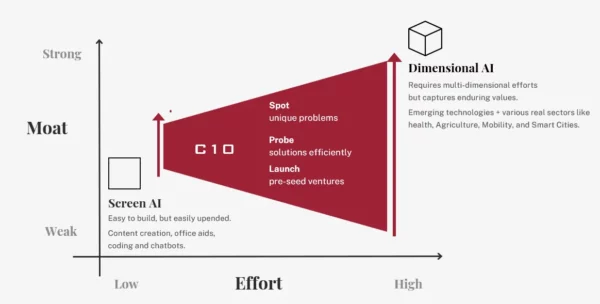Today, we feature a post from a Guest Contributor. It was written by Robert Traester, CPA, of WithumSmith+Brown, a current member at CIC Cambridge.
For many taxpayers, the Form 1040 consists of just a few important lines of information: Demographic information, a W-2 (or a few), maybe a couple of 1099s, and most importantly the lines at the end that show if you owe money or can expect a nice refund. However, if you look closely at the form, you may notice some buried treasures that get you asking, “what exactly is this and who does this apply to?”
1. Presidential Election Campaign Fund
Hidden amongst all of the demographic detail, you might notice a box for the presidential election campaign. This may present some questions to both the novice and even the more experienced taxpayer. Aren’t all candidates rich these days? Aren’t they all funded by Super PACs? Why do they need any more of my money? Why is the amount three dollars?
One important concept to point out right away is that this box does not impact your tax liability, it simply dictates if you want three dollars of the taxes you’ve paid to go to this designated public fund. Many are guilty of quickly reading the bold print and moving on, but the details inside the box make note of this important concept.
The fund was originally established as a checkbox on Form 1040 in an effort to encourage presidential candidates to receive funds from the public, rather than from special interest groups. While many lobbyists still push for this checkbox to remain on the return, candidates who choose to receive money from the public fund are limited in their total spending making this notion not a realistic possibility. With so much money coming through private contributions these days and rising campaign expenses, the choice has been clear for most candidates to not take the public funds. No major-party presidential nominee has accepted the primary matching funds since Al Gore in 2000 and no nominee has accepted public funding for the general election since John McCain in 2008. In the meantime over $250 million dollars is sitting idle in a public fund. The lack of fund use has been mirrored on actual taxpayer participation, with 2015 participation down to 5.4%, a drastic change from its high of roughly 30% in 1977. While the amount did increase from $1 to $3 in 1994, many argue that the amount still remains too small to make a difference. Additionally, some have pushed to raise the spending limits for those using the fund in order to become more competitive with the amount candidates can raise privately.
The presidential election campaign line has been on Form 1040 for years and while it seems underutilized by today’s candidates, the option still remains for the public to donate three dollars of their already paid taxes to this designated fund. This is only one of the hidden treasures that exist on Form 1040.
2. Line 24 – Certain business expenses of reservists, performing artists, and fee-basis government officials
Another buried treasure can be found on Line 24 of the form titled, “Certain business expenses of reservists, performing artists, and fee-basis government officials”. Once again, this form item presents some questions. Why are these selected industries given a separate expense category? Who qualifies as a fee-basis government official? What’s so special about deducting the expenses here? It becomes clear why so many taxpayers just skip over this line.
First it may help to define what exactly some of these groups are. Internal Revenue Code Section 62 classifies an eligible “reservist” as a member of the National Guard or reserve members who traveled more than 100 miles from home to perform services as a National Guard or reserve member. A qualified performing artist must perform services as an artist for at least two employers, be compensated at least $200 by two or more employers, have expenses greater than 10% of this income, and have total adjusted gross income (AGI) of $16,000 or less. There are some other formalities for this one, but the overall theme is that it is meant to benefit the classic “struggling artist.” A fee-basis state or local government official applies to those employed by a state or political subdivision of a state and are compensated at least partially on a fee basis.
While one can infer how fee basis employees of the government and members of the National Guard were given this special treatment, one might wonder how jugglers were lumped into the same category. The story involves Sandra Karas who lobbied during the 1980s for this deduction, arguing that artists were an important part of the American culture and should be granted incentives, since so many financially struggle.
The benefit of this deduction is that it allows members of these select occupations to deduct eligible business expenses without the need to list them as an itemized deduction. This is particularly helpful for those taxpayers that don’t have enough other expenses to itemize and those that do itemize but are restricted by their need to exceed the “2% floor” that is often required for employee business expenses to become deductible.
One interesting piece of history regarding this deduction is the $16,000 maximum AGI that is allowed for performing artists. This figure has been fixed since 1986 and has not kept pace with inflation or even with the filing requirement threshold which has continued to increase. In 2015, single taxpayers under 65 did not have to file unless their gross income exceeded $10,300. The taxpayers for which this particular deduction applies continues to shrink with each passing year.
3. Line 21 – “Other Income”
Line 21 has become a catch-all line that basically collects all income that doesn’t fall into another section of a taxpayer’s return. The IRS provides examples such as, prizes, jury duty pay, recapture of amounts previously deducted, taxable distributions from an HSA, etc. However, one particular type of income does stand out and presents some interesting dialogue: income from illegal activities. Once again this presents some interesting questions. Why would I tell the government about illegal activities? Can I deduct associated expenses? What are the consequences of not including this income?
The first thing that comes to mind when I think of illegal activities and failing to report associated income is one of history’s most notorious criminals; Al Capone. Al Capone was convicted of income tax evasion in 1931. Not that I condone Mr. Capone’s activities, but when you’re talking about illegal drugs, murder, and other heinous crimes, do you really want tax evasion to be the crime that puts you away?
Now in practice most criminals only report their income after they’ve already been charged for their income producing crimes. The mentality is that these individuals have already been discovered by law enforcement, why tack on another charge at that point. However, the IRS is actually legally required to not disclose confidential information unless subject to a court order. This obligation is spelled out in the IRS Publication 4639: Disclosure and Privacy Law Reference Guide and can be found under Internal Revenue Code Section 6103.
With respect to the deductibility of expenses incurred with the connection of illegal activities, the answer is every tax person’s favorite, “it depends”. For example, under 280E of the IRC, no expenses are allowed if they are associated with carrying on the trade or business of trafficking controlled substances. More recently, this code section has been extracted to include marijuana businesses that are conducted in states where the sale of marijuana has become legal. Although marijuana sales have become legal on many state levels, the business remains illegal at a federal level and thus still falls victim to this IRC section as it’s federal law. On the other hand, court cases such as Commissioner v. Tellier do allow for the deduction of business expenses associated with an illegal activity. In this court case the defendant was allowed to deduct his legal expenses that were incurred while defending his illegal business in court, arguing that they were ordinary and necessary and that the tax should be on net income, rather than gross. As you can see, the rules can be a bit complicated, so if you’re a criminal it might be best to start talking to a CPA to figure out your best tax approach.
Conclusion
Form 1040 is full of underlying history, political compromises, and even some outdated practices. On the surface much of this may never apply to you, but next time you’re filling one out it might not hurt to take a closer look.
About the Author
Robert Traester, CPA is a Senior Tax Associate at WithumSmith+Brown. Robert can be reached at rtraester@withum.com or at 617.849.6166.
About Withum
WithumSmith+Brown, PC (Withum) is a full service accounting, tax and advisory firm with more than 40 years of experience. Withum works with clients ranging from startups and emerging growth companies to large public organizations across the country. Ranked in the top 30 firms in the nation, with has the experience and expertise to put you in a position of strength.




